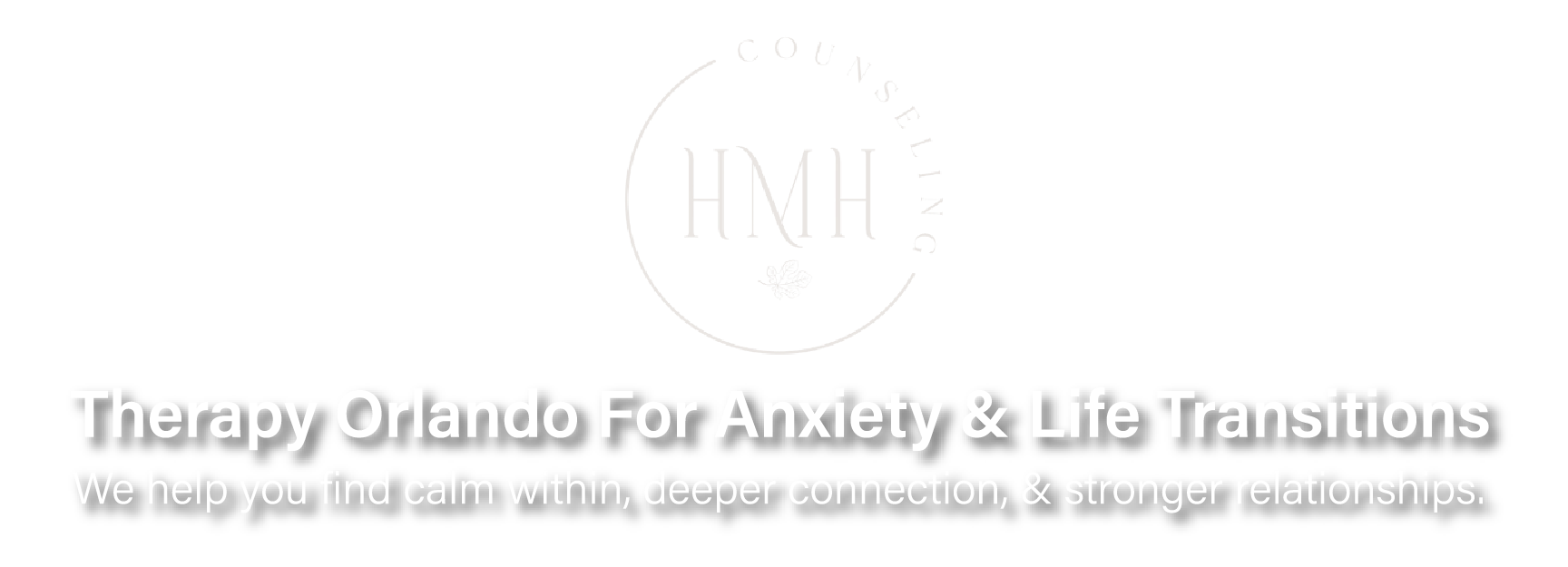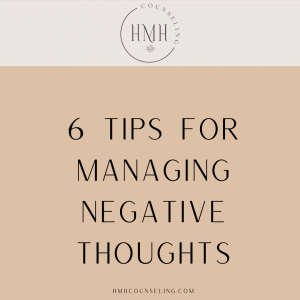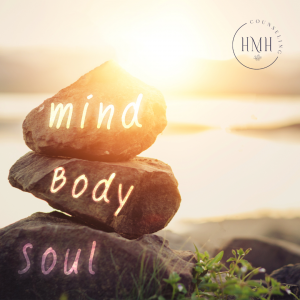January 19 • Written by Jennifer Sierra, LMHC
The holidays, while filled with joy and celebration, can disrupt our habitual routines and leave us feeling slightly out of balance. As we navigate the post-holiday waters, it’s important to take gentle steps toward restoring our personal rhythm so that can reconnect with holistic self-care and mental well-being Remember, even small steps count, and minor adjustments can lead to significant improvements in your overall wellness.
1. Acknowledge your current feelings
First, accept where you are. It’s completely okay to need some time to adjust and revert to your usual pace. It can be lonely once your friends and loved ones aren’t around as much or maybe you even feel relieved to get back to a normal routine. The start of a new year can hold immense pressure to suddenly transform our lives, but allow yourself the space to process the events of the holiday season and gradually flow back into your routine.
At HMH Counseling, we believe it’s so important to acknowledge and honor these feelings as you transition back into your daily routine. Give yourself permission to process the holiday happenings and gradually recapture the comfort of your usual pace. While New Year pressures mount, remember it’s okay to take one step forward at a time, letting nature guide your way to equilibrium.
2. Gradual Changes for Lasting Impact
Perfection isn’t the goal for post-holiday revival. instead, It is essential to make small, sustainable changes consistently. Rather than overhauling your life all at once, reintroduce one meaningful habit or routine at a time. This approach alleviates feelings of being overwhelmed and encourages lasting positive change.

Leap into a vibrant new phase of wellness and joy. Embrace the transformation that holistic mental health counseling can bring.
3.Prioritize Physical Well-being
At the heart of regaining your balance after the holiday season lies the practice of self-care. This involves the pursuit of nutritious meals, regular physical activities like walking, and an essential focus on adequate hydration.
In the journey towards holistic wellness, food plays an important role. Whole foods – fruits, vegetables, lean meats, fish, nuts, and seeds – are rich in essential nutrients that fuel your body and mind. Opting for minimally processed foods can limit your intake of added sugars, salts, and unhealthy fats that often come with processed fare. Home cooking is another key element of healthy living. Preparing your meals gives you control over your food choices, quality, and portion sizes. Use this as an opportunity to try new, nutritious recipes while reducing your reliance on take-out or delivery options. Remember that feeding yourself well is not about deprivation, but about nourishing yourself with the goodness that nature offers.

Eat well, feel well. Nurture your body with nutrition-packed foods.
Next, let’s move to physical activity.
Physical movement is an invaluable element in enhancing your overall sense of well-being. It can help lift your spirits, curb anxiety, facilitate better sleep, and boost your mental well-being. Walking, a simple and achievable form of exercise, can be particularly beneficial. It doesn’t demand specialized equipment or a gym membership, and it’s adaptable to your routine – anywhere, anytime. Whether a quick-paced walk in the park, a tranquil wander in your neighborhood, or even pacing in your living room while enjoying a podcast, consistency is key. Aiming for a 30-minute walk daily can lead to significant improvements in your mental and physical health.

Walking for holistic mental health benefits.
Then comes hydration, an often underestimated aspect of self care. It supports normal bodily functions such as digestion and circulation, and even contributes to a healthy skin complexion. Aiming for at least eight 8-ounce glasses of water, roughly 2 liters or half a gallon, per day is a general guideline. However, individual hydration needs may differ depending on age, sex, weight, activity level, and overall health condition. Tune into your body’s signals and hydrate as per your needs. While all fluids can contribute to your daily total, water remains the optimal choice.
Taking care of your physical well-being is an act of respect towards the sanctuary that is your body – an essential part of holistic self-care.

Quench more than your thirst, keep hydrated for your overall well-being.
4. Sleep is Key

Rest easy, wake refreshed. Your body rejuvenates during sleep.
If there’s one thing that often gets compromised during holidays, it’s restorative sleep. Never underestimate the healing power of a good night’s sleep. Achieving a good night’s sleep can restore energy levels and help regain emotional balance. As you transition out of the holiday season, it is important to re-establish a regular, healthy sleep pattern. One way to achieve this is by maintaining consistent bedtimes and wake-up times. Going to bed and waking up at the same time each day can help regulate your body’s internal clock and enhance sleep quality.
In today’s digital age, device time can intrude on our sleep cycle. The blue light emitted by screens can interfere with our natural sleep signals. Try to cut out device time at least an hour before bed – instead, engage in relaxing activities such as reading a book, meditating, or taking a warm bath. Making these changes can create a conducive environment for sleep, allowing your body and mind to wind down and prepare for rest.
Aim to get 7-8 hours of sleep each day. Prioritizing sleep is an integral aspect of holistic self-care and overall wellness.
5. Lean on Your Support System
Seek the assistance of your support network—family, friends, or mental health professionals—when necessary. Remember, your loved ones can provide not only comfort, but also a healthy perspective and sound advice when you need it most. Engaging in conversations with trusted individuals can be a source of encouragement, reassurance, and problem-solving assistance. Often, simply sharing your feelings and thoughts can lighten your emotional load, allowing you to face challenges with renewed strength and confidence.
Your support network can also serve as accountability partners, helping you keep track of your progress and maintain consistency in your self-care journey. They can join you in activities like walking or starting new hobbies, making the process more enjoyable and collaborative.
Reaching out to others for support is also an opportunity to strengthen your relationships and foster a sense of belonging within your social circle. Genuine connections with others contribute significantly to your overall mental well-being, making it crucial to invest time and effort in nurturing them.
Conclusion
Keep in mind that even minor shifts in your lifestyle can lead to major improvements in your wellness. By acknowledging your feelings, taking one step at a time, nourishing your body, prioritizing sleep, and leaning on your support system, you can successfully navigate the post-holiday period and reclaim your rhythm of self-care.
If getting back to your “normal” proves exceptionally challenging or if you notice a persistent shift in mood, appetite, or sleep, don’t hesitate to seek professional help. These could be signs of underlying mental health concerns, and it’s important to address them promptly. Your primary care doctor or a specialized mental health care provider can provide the support and guidance you need.
At HMH Counseling based in Orlando, FL, we understand that every mental health journey is unique. We’re committed to providing personalized and holistic support that goes beyond talk therapy and comprehensively nurtures your mind, body, and spirit. If you’re in need of personalized care or ready to begin your healing journey, we’re here for you. Contact us today for compassionate and mindful support.
Disclaimer: The content provided on this blog is for informational purposes only and is not intended to serve as professional advice, diagnosis, or treatment. The information shared is based on our understanding and interpretation of various mental health topics. It is important to recognize the complexity of mental health issues, and the advice provided here may not address the specific needs of every reader. The content on this blog should not be considered a substitute for professional advice from a qualified mental health professional. Always seek the advice of a licensed therapist or other qualified mental health provider with any questions or concerns you may have regarding your mental health or well-being.




